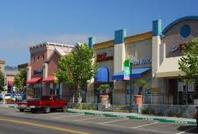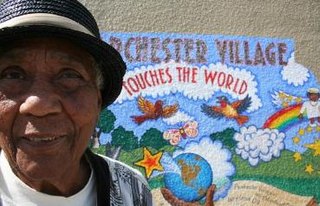History
The site, formerly a trailer park and the Lucky Lanes bowling alley, was converted into parking and a card club in 1994. Later in 2002, restricted gambling was permitted. The casino shares its revenues with the city of San Pablo (7%) where it forms the city's economic backbone. [1]
In 2005 the casino was expanded into a "full-fledged" casino with slot machines and video bingo. [3] However, by 2016 the workers who were making an average of $12 an hour were complaining that it was too low with the salaries at nearby Oaks Card Club being $14 and Graton Casino also hovering around $14 and thus asked for a 12% wage hike. In 2014 the casino was making an estimated $277 million annually. [4] Nevertheless, the tribe of 350 people was reported to be paying its unionized employees $9.50 an hour on average just 5 years earlier. [5]
Then-California Assembly member Loni Hancock opposed adding the video bingo machines because she said that they look and feel like real slot machines and amounted to a technological loophole and that it would bring more traffic and crime to the area. [6]
In 2018 the tribe donated $1 million to a fund to support the victims of the Camp Fire. [7] [8]
In 2019 patrons of the casino were followed home and robbed at gunpoint across the bay in South San Francisco. [9] [10] [11] Also in 2019 the casino bought the former hospital site for $13.5 million and razed it to expand parking by 1,000 spaces. It was believed this would alleviate parking in the surrounding neighborhoods and be of economic benefit to the city of San Pablo, which receives over 50% of its funding from casino revenues. [12]
In 2019, with the help of Congressman Jared Huffman, the tribe was seeking to establish a non-gambling homeland adjacent to Windsor in Sonoma County. The plans are to build housing, a resort hotel, and a winery on a 500-acre site. [13] It is known as the Lytton Rancheria Homelands Act. [14]
Also in 2019, a Daly City woman won nearly $781,000 in a jackpot from a slot machine here. [15]

A slot machine, fruit machine, poker machine or pokies is a gambling machine that creates a game of chance for its customers. Slot machines are also known pejoratively as one-armed bandits, alluding to the large mechanical levers affixed to the sides of early mechanical machines, and to the games' ability to empty players' pockets and wallets as thieves would.

Native American gaming comprises casinos, bingo halls, slots halls and other gambling operations on Indian reservations or other tribal lands in the United States. Because these areas have tribal sovereignty, states have limited ability to forbid gambling there, as codified by the Indian Gaming Regulatory Act of 1988. As of 2011, there were 460 gambling operations run by 240 tribes, with a total annual revenue of $27 billion.

The Sycuan Band of the Kumeyaay Nation is a federally recognized tribe of Mission Indians from Southern California, located in an unincorporated area of San Diego County just east of El Cajon. The Sycuan band are a Kumeyaay tribe, one of the four ethnic groups indigenous to San Diego County.

El Cerrito Plaza is a shopping center in El Cerrito, California, a suburb in the San Francisco Bay Area.
The Lytton Band of Pomo Indians is a federally recognized tribe of Pomo Native Americans. They were recognized in the late 1980s, as lineal descendants of the two families who lived at the Lytton Rancheria in Healdsburg, California from 1937 to about 1960. The tribe now has around 275 enrolled members. It has a casino in San Pablo, California, and has proposed to build housing for tribe members, plus a winery and a hotel, just west of Windsor, California, in Sonoma County.

Viejas Casino and Resort is a hotel casino and outlet center owned by the Viejas Band of Kumeyaay Indians, located in Alpine, California. The casino has over 2,000 slot machines, up to 86 table games, three restaurants, a deli, bingo, an off-track betting facility, lounge, concert venues and multiple indoor and outdoor meeting spaces. Opened in March 2013, the original hotel had 128 rooms; an expansion was completed in October 2015 with the opening of an additional hotel tower with 109 deluxe rooms and luxury suites increasing hotel accommodations to a total of 237 rooms and suites.

Parchester Village is a planned majority African-American village in northwestern Richmond, California that was the first in the state to sell to blacks.
The Graton Rancheria was a 15.45-acre (62,500 m2) property in the coastal hills of northern California, about two miles (3 km) northwest of Sebastopol. The site is about 1.5 miles (2.4 km) southwest of the hamlet of Graton, population 1,815 in 2000. The area is a few miles west of Santa Rosa, the largest of Sonoma County's nine cities and the County seat, population 147,595 in 2000. It was a former rancheria for Central Coast and Central valley tribes, including the Southern Pomo, a Hokan-speaking tribe, and Coast Miwok.
The Buena Vista Rancheria of Me-Wuk Indians of California is a federally recognized tribe of Miwok in Amador County, California. The Buena Vista Miwok are Sierra Miwok, an indigenous people of California.

Seminole Hard Rock Hotel & Casino Tampa is a gaming complex and hotel that opened in 2004. It is located on the Tampa Reservation off of Interstate 4, just east of Tampa, Florida. The 190,000 square foot casino has been expanded multiple times since its opening. It is a 24-hour venue that permits smoking indoors.

Point Molate Naval Fuel Depot is a decommissioned United States Navy fueling station on the western shore of Richmond, California on San Francisco Bay. It has undergone years of litigation and debate as to its redevelopment with proposals ranging from a billion dollar casino project, parkland, housing, and other mixed uses.

InterCasino established the first online casino in 1996 and is part of the InterCasino Group, which is owned and operated by CryptoLogic Operations Ltd, a subsidiary of Goldstar Acquisitionco Inc. Registered in Malta, it is regulated by the Lotteries & Gaming Authority of Malta.

John Gioia is an American politician. He has served on the Contra Costa County Board of Supervisors in Contra Costa County, California since 1998 and was re-elected three times. He served as chair in 2002, 2006 and 2010. John Gioia is a Democrat. Contra Costa supervisorial seats are non-partisan.
Cache Creek Casino Resort is a casino/resort located in Brooks, California, in Northern California's Capay Valley. Opened as a bingo hall in July 1985, it was renovated in 2002 and completed in 2004 as a destination resort. The connected hotel contains 659 rooms, including 27 suites. Cache Creek offers 2,300 slot machines, more than 85 table games, a 14 table poker room(currently closed after Covid), day spa, eleven restaurants, and an 18-hole championship golf course.
I. Nelson Rose is an internationally known author and public speaker, and is recognized as one of the world's leading experts on gambling and gaming law. He is currently a Professor Emeritus at Whittier College and a Visiting Professor at the University of Macau. Rose is best known for his internationally syndicated column and 1986 book, Gambling and the Law. To further educate and inform on the subject, he also maintains a comprehensive website, "Gambling and the Law," which can be found at www.gamblingandthelaw.com.
The Guideville Band of Pomo Indians is a Native American tribe of the Pomo Indians of northern California.
The Koi Nation of the Lower Lake Rancheria is a federally recognized tribe of Southeastern Pomo people in northern California. Their name for their tribe is Koi Nation of Northern California, from their traditional village, Koi, once located on an island in Clear Lake.
Legal forms of gambling in the U.S. state of Texas include the Texas Lottery; parimutuel wagering on horse and greyhound racing; limited charitable bingo, limited charitable raffles, and three Native American casinos. Other forms of gambling are illegal in Texas.

Graton Resort & Casino is an Indian casino and hotel outside Rohnert Park, California, that opened on November 5, 2013. It is owned and operated by the Federated Indians of Graton Rancheria. The casino has 3,000 slot machines, 144 table games, and a poker room. In November 2016 it opened an adjacent hotel with 200 rooms.
Legal forms of gambling in the U.S. state of Massachusetts include casinos, sports betting, parimutuel wagering on horse racing, the Massachusetts Lottery, and charitable gaming. The Massachusetts Gaming Commission regulates commercial operations under state jurisdiction.











